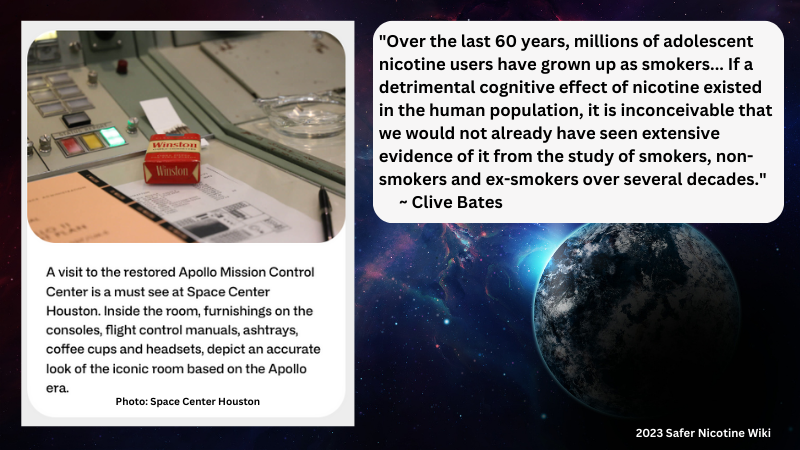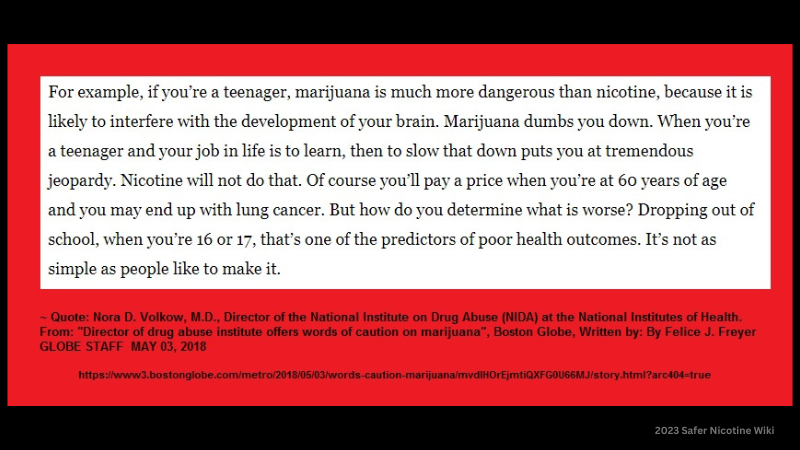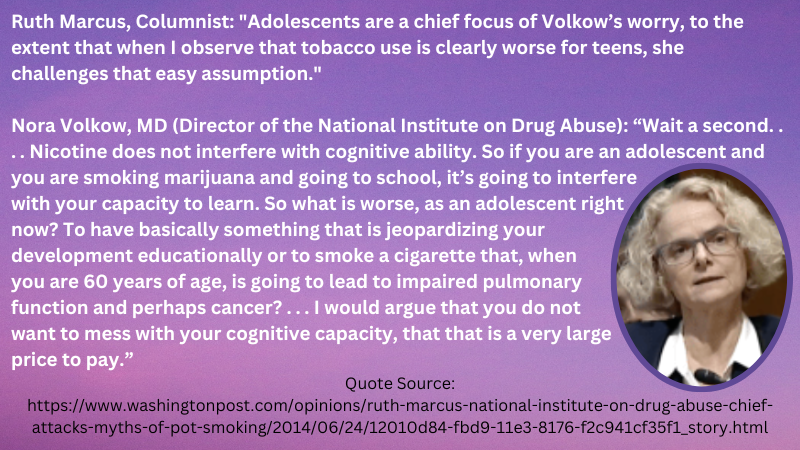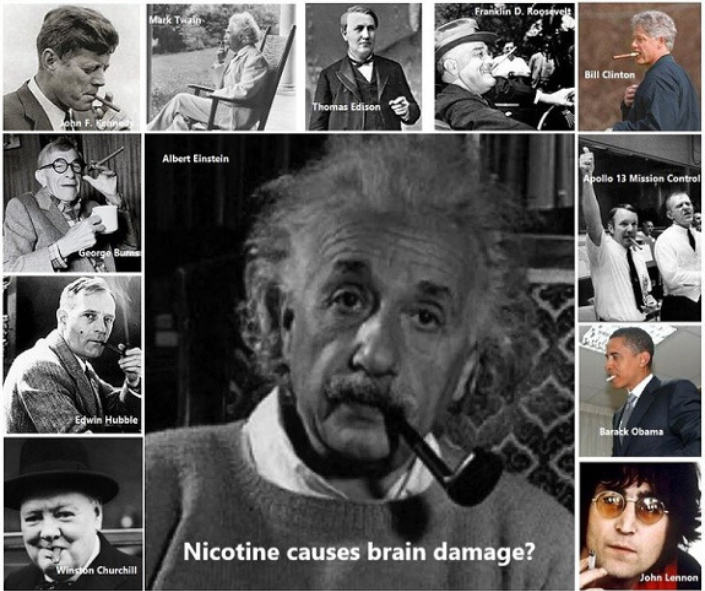Does nicotine damage the developing adolescent brain?
Jump to navigation
Jump to search

Scientific Publications - Youth - Cognition, Memory, and IQ
- "Animal model studies have found that nicotine can affect maturation of brain parts associated with executive function and decision-making, potentially leading to more impulsive behavior, cognitive deficits, and greater likelihood to self-administer other drugs. In addition, there is evidence in humans of neurological changes attributed to nicotine in the brains of adolescent smokers, interpreted by some as reflecting similar harmful effects to those in the animal models."
- "These studies lead some researchers to suspect that adolescent nicotine use in any form may lead to long-term structural and functional brain changes with associated negative implications for cognition or impulse control. However, given species differences and questions about the relevance of experimental animal nicotine dosing paradigms to human use patterns, the validity of extrapolation to humans is speculative. Whether impaired brain development with behavioral consequences occurs in young nicotine consumers is difficult to determine because of potential confounding of genetic and socioeconomic factors, the influence of other substance abuse, and the role of preexisting neuropsychiatric problems associated with youth smoking. Research has yet to isolate nicotine use in the adolescent years and then examine later sequelae. Still, concerns about brain function effects of nicotine exposure through vaping deserve serious examination."
- Citation: David J. K. Balfour, Neal L. Benowitz, Suzanne M. Colby, Dorothy K. Hatsukami, Harry A. Lando, Scott J. Leischow, Caryn Lerman, Robin J. Mermelstein, Raymond Niaura, Kenneth A. Perkins, Ovide F. Pomerleau, Nancy A. Rigotti, Gary E. Swan, Kenneth E. Warner, and Robert West, 2021: Balancing Consideration of the Risks and Benefits of E-Cigarettes, American Journal of Public Health 111, 1661_1672, https://doi.org/10.2105/AJPH.2021.306416
- "Educational achievement did not differ within twin pairs discordant for smoking, in adults and adolescents."
- Citation: Treur, J. L., Willemsen, G., Bartels, M., Geels, L. M., van Beek, J. H., Huppertz, C., van Beijsterveldt, C. E., Boomsma, D. I., & Vink, J. M. (2015). Smoking During Adolescence as a Risk Factor for Attention Problems. Biological psychiatry, 78(9), 656–663. https://doi.org/10.1016/j.biopsych.2014.06.019
- “Past smoking was not associated with significantly poorer performance than never smokers in any cognitive domain.”
- Citation: Corley, J, Gow, AJ, Starr, JM & Deary, IJ 2012, 'Smoking, childhood IQ and cognitive function in old age', Journal of Psychosomatic Research, vol. 73, no. 2, pp. 132-138. https://doi.org/10.1016/j.jpsychores.2012.03.006
- “The [inverse] IQ–smoking association disappeared after adjustments for shared environment and genetics.”
- Citation: Wennerstad, K. M., Silventoinen, K., Tynelius, P., Bergman, L., Kaprio, J., & Rasmussen, F. (2010). Associations between IQ and cigarette smoking among Swedish male twins. Social science & medicine (1982), 70(4), 575–581. https://doi.org/10.1016/j.socscimed.2009.10.050
Conference Presentations
2022: E-Cigarette Summit US
- Video - Prof Peter Hajek: Does Nicotine Harm The Developing Brain?
2020: Dr. Brad Rodu
- Source: The CDC Nicotine Brain Fallacy / Bio
- "The harm in brain development federal officials talk non-stop about only happens in laboratory torture of mice. Mouse studies are well known to be of questionable value in predicting human effects. There is absolutely no scientific evidence to support the claim that nicotine causes harm to human brain development, so it is astounding that federal officials traffic in this false narrative. This nonsense is an affront to 34 million adult current smokers and 55 million former smokers in the U.S., virtually all of whom started when they were teenagers. There is no evidence that their brain development was harmed, a fact that was specifically acknowledged by a prestigious nicotine researcher Dr. Neal Benowitz at an international tobacco meeting this week."
2020: Clive Bates
- Nicotine science and policy Q & A
- No, this is a scare story and the claims do not bear scrutiny. Some public figures, including the US Surgeon General, have suggested that nicotine damages the adolescent brain. The evidence for this hypothesis comes only from a few rodent studies. These are an unreliable guide to human risk because the rodent brain does not offer a reliable proxy for the human brain and it is difficult to design experiments that are controlled to give a mouse equivalent exposure to a human.
- But this is not the main reason for doubt. Over the last 60 years, millions of adolescent nicotine users have grown up as smokers and either continue to use nicotine or have quit. The problem for the Surgeon General and others is that there is no sign of any cognitive impairment in the population of former teenage smokers and many of today’s finest adult minds were once young smokers. If a detrimental cognitive effect of nicotine existed in the human population, it is inconceivable that we would not already have seen extensive evidence of it from the study of smokers, non-smokers and ex-smokers over several decades."
2018: Nora Volkow MD (NIDA) comparing youth nicotine use with marijuana use
- Director of drug abuse institute offers words of caution on marijuana
- Freyer: "But isn’t marijuana much safer than the other legal drugs, alcohol and tobacco? Can you die from marijuana?"
- Volkow: "You can die from marijuana if you’re intoxicated and driving a car. I don’t know that it is safer. It depends on what stage in your life you are."
- "For example, if you’re a teenager, marijuana is much more dangerous than nicotine, because it is likely to interfere with the development of your brain. Marijuana dumbs you down. When you’re a teenager and your job in life is to learn, then to slow that down puts you at tremendous jeopardy. Nicotine will not do that. Of course you’ll pay a price when you’re at 60 years of age and you may end up with lung cancer. But how do you determine what is worse? Dropping out of school, when you’re 16 or 17, that’s one of the predictors of poor health outcomes. It’s not as simple as people like to make it."
2014: Nora Volkow MD (NIDA) comparing youth nicotine use with marijuana use
- The myths of smoking pot / Photo Source
- Marcus: "Adolescents are a chief focus of Volkow’s worry, to the extent that when I observe that tobacco use is clearly worse for teens, she challenges that easy assumption."
- Volkow: “Wait a second. . . . Nicotine does not interfere with cognitive ability. So if you are an adolescent and you are smoking marijuana and going to school, it’s going to interfere with your capacity to learn. So what is worse, as an adolescent right now? To have basically something that is jeopardizing your development educationally or to smoke a cigarette that, when you are 60 years of age, is going to lead to impaired pulmonary function and perhaps cancer? . . . I would argue that you do not want to mess with your cognitive capacity, that that is a very large price to pay.”
Rodent Studies vs. Human Studies
- Link to full paper
- "Our results demonstrate species divergence of gene expression between homologous cell types... these results help to resolve the paradox of failures in the use of mouse for preclinical studies ..."
- "When it comes to determining what will make humans healthy and disease-free, research involving mice has had remarkably few successes."
- "As soon as journalists see the word “mouse” in a study (or “rat,” “hamster,” etc.), they should put down the press release, delete any related emails, and refuse to write a word about that study. As a society, we waste billions of dollars and innumerable hours pursuing remedies and diets and exercise plans that may not even work in humans. The media bear a great deal of responsibility for this. To be fair, there have been many instances in which a reporter has pointed out that the study featured in his or her article was conducted on mice and may not be applicable to humans. But this is not nearly enough. When readers see a “breakthrough” treatment or diet plan advertised in the headline, they have already been misinformed — even if there is a modest disclaimer several paragraphs later."
Shareable Graphics
Nora Volkow 2018

Nora Volkow 2014

Famous People Who Smoked

Scientific Publications - NOT YOUTH SPECIFIC - Cognition, IQ, and Memory
- In this review, we first introduce the beneficial effect of nicotine on cognition including attention, short-term memory and long-term memory. We next summarize the beneficial effect of nicotine on cognition under pathological conditions, including Alzheimer's disease, Parkinson's disease, Schizophrenia, Stress-induced Anxiety, Depression, and drug-induced memory impairment.
- Qian Wang, Weihong Du, Hao Wang, Panpan Geng, Yanyun Sun, Junfang Zhang, Wei Wang, Xinchun Jin, PMID: 36736944 DOI: 10.1016/j.pnpbp.2023.110723
- Nicotine improves sustained attention and reduces distractor interference, promoting cognitive stability. Nicotine enhances response times without differential impact on task switching or distraction.
- PDF Version
- Citation: Stefan Ahrens, Christiane M. Thiel, Effects of Nicotine on Task Switching and Distraction in Non-smokers. An fMRI Study, Neuroscience, Volume 444, 2020, Pages 43-53, ISSN 0306-4522, doi: 10.1016/j.neuroscience.2020.07.029.
- Acknowledgements: This work was supported by a grant from the German Research Foundation DFG TH766/8-1.
2019: Molecular Insights Into Memory-Enhancing Metabolites of Nicotine in Brain: A Systematic Review
- Nicotine lowers learning and memory impairment in some neurological disorders.
- Citation: Majdi, A., Kamari, F., & Gjedde, A. (2019). Molecular Insights Into Memory-Enhancing Metabolites of Nicotine in Brain: A Systematic Review. Frontiers in Neuroscience, 12. https://doi.org/10.3389/fnins.2018.01002
- Preclinical models and human studies have demonstrated that nicotine has cognitive-enhancing effects. Attention, working memory, fine motor skills and episodic memory functions are particularly sensitive to nicotine’s effects.
- PDF Version
- Citation: Valentine G, Sofuoglu M. Cognitive Effects of Nicotine: Recent Progress. Curr Neuropharmacol. 2018;16(4):403-414. doi: 10.2174/1570159X15666171103152136. PMID: 29110618; PMCID: PMC6018192.
- Nicotine is used for a number of reasons. In human studies, acute administration of nicotine can have positive effects on cognitive processes, such as improving attention, fine motor coordination, concentration, memory, speed of information processing, and alleviation of boredom or drowsiness. Some nicotine users benefit from self-medication effects for alleviation of stress, anxiety, depression, and other mental health and medical conditions, including schizophrenia and Parkinson’s Disease. Nicotine also reverses cognitive deficits caused by withdrawal. It is not clear if chronic use of nicotine enhances cognitive function.
- Some subgroups, such as those with an underlying vulnerability to mental health or medical conditions, may benefit, more or less, from the use of nicotine, when compared with the general population.
- Truth Initiative / Schroeder Institute: Raymond Niaura, PhD. - This paper was also reviewed by content area experts whose feedback was included: Drs. Neal Benowitz, Peter Shields, Dorothy Hatsukami, and Ken Warner
- The e-cigarette can reduce desire to smoke and nicotine withdrawal symptoms 20 minutes after use.
- The nicotine content in this respect may be more important for males.
- The first study to demonstrate that the nicotine e-cigarette can improve working memory.
- PDF Version
- Citation: Dawkins, L., Turner, J., Hasna, S., & Soar, K. (2012). The electronic-cigarette: Effects on desire to smoke, withdrawal symptoms and cognition. Addictive Behaviors, 37(8), 970–973. doi:10.1016/j.addbeh.2012.03.004
- Electronic Cigarette Company (TECC) supplied the e-cigarettes and cartridges for this study. TECC had no involvement in the design or conduct of the study.
2003 Psychoactive Drugs and Pilot Performance: A Comparison of Nicotine, Donepezil, and Alcohol Effects
- Compared to placebo, nicotine and donepezil significantly improved, while alcohol significantly impaired overall flight performance. Both cholinergic drugs showed the largest effects on flight tasks requiring sustained visual attention.
- PDF Version
- Citation: Mumenthaler, M., Yesavage, J., Taylor, J. et al. Psychoactive Drugs and Pilot Performance: A Comparison of Nicotine, Donepezil, and Alcohol Effects. Neuropsychopharmacol 28, 1366–1373 (2003). doi: 10.1038/sj.npp.1300202
- Acknowledgements: This research was supported in part by NIMH Grant 40041; NIA Grant AG17824; the Sierra-Pacific Mental Illness Research, Education, and Clinical Center (MIRECC); the Alcohol Beverage Medical Research Foundation; the Swiss Foundation for Alcohol Research; the Swiss National Science Foundation; and the Medical Research Service of the Department of Veterans Affairs.
- These results are consistent with other recent research suggesting a primary effect of nicotine in enhancing cognitive performance.
- Citation: Foulds, J., Stapleton, J., Swettenham, J. et al. Cognitive performance effects of subcutaneous nicotine in smokers and never-smokers. Psychopharmacology 127, 31–38 (1996). https://doi.org/10.1007/BF02805972
1994 Smoking and raven IQ
- Nicotine has recently been shown to enhance measures of information processing speed including the decision time (DT) component of simple and choice reaction time and the string length measure of evoked potential waveform complexity. Both (DT and string length) have been previously demonstrated to correlate with performance on standard intelligence tests (IQ).
- In this experiment we used the Raven Advanced Progressive Matrices (APM) test. APM scores were significantly higher in the smoking session compared to the non-smoking session, suggesting that nicotine acts to enhance physiological processes underlying performance on intellectual tasks.
- PDF Version
- Citation: Stough, C., Mangan, G., Bates, T. et al. Smoking and raven IQ. Psychopharmacology 116, 382–384 (1994). doi: 10.1007/BF02245346
- Nicotine improves attention in a wide variety of tasks in healthy volunteers.
- Nicotine improves immediate and longer term memory in healthy volunteers.
- Nicotine improves attention in patients with probable Alzheimer's Disease.
- While some of the memory effects of nicotine may be due to enhanced attention, others seem to be the result of improved consolidation as shown by post-trial dosing.
- PDF Version
- Citation: Warburton DM. Nicotine as a cognitive enhancer. Prog Neuropsychopharmacol Biol Psychiatry. 1992 Mar;16(2):181-91. doi: 10.1016/0278-5846(92)90069-q. PMID: 1579636.